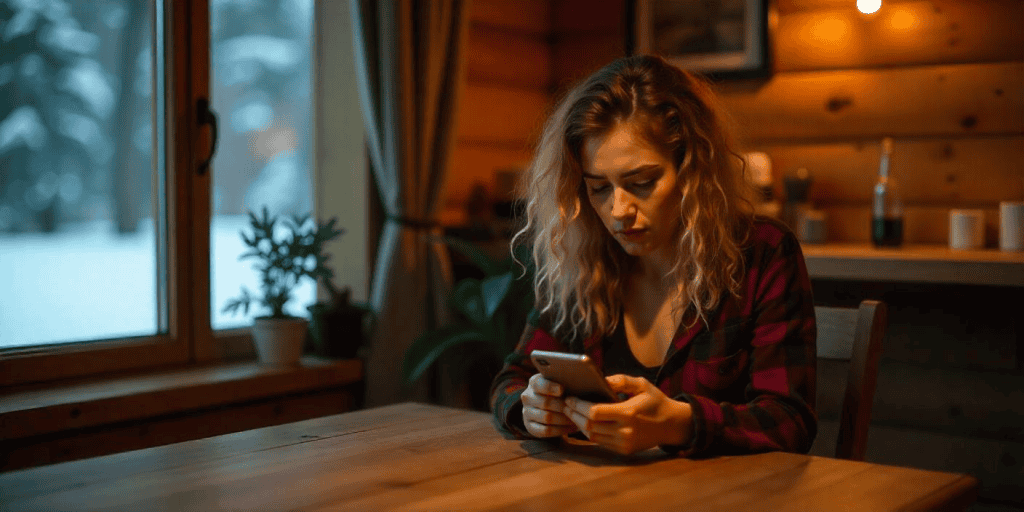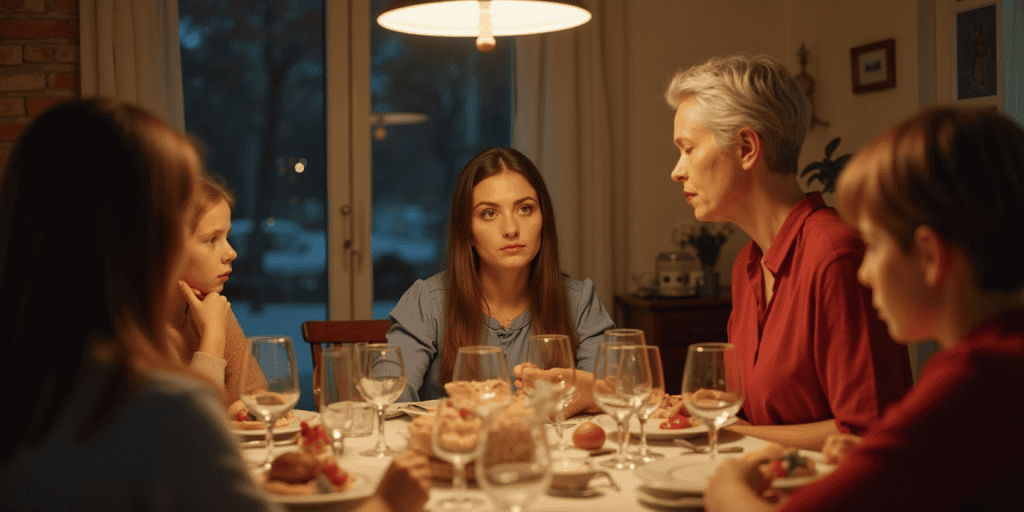I still remember the first time I almost spoke up… and didn’t.
It was after a family dinner where my toxic sister made a degrading joke about me.
Everyone laughed. I forced myself to laugh, too.
That was always the unspoken rule in my dysfunctional family: don’t make things awkward. Don’t make it worse.
But that night, lying in bed, the tears came. I felt humiliated and alone. I wanted to tell someone… anyone… but instead, I stayed quiet.
At the time, I hated myself for that silence.
I thought I lacked courage. I thought maybe I deserved it somehow.
But looking back now, I realize I wasn’t weak.
I was protecting myself the only way I knew how.
Silence, back then, wasn’t surrender. It was survival.
And if you stayed silent, too, please understand this: it doesn’t mean you failed.
It means you did what was necessary to stay safe in a world that didn’t understand your pain yet.
Table of Contents
1. Fear of Not Being Believed (And Being Blamed Instead)

The first time I tried to open up, I turned to my toxic sister.
I had practiced what I was going to say for days.
I wanted to describe the isolation, the emotional abuse, the way my narcissistic mother controlled what I wore, what I said, and who I talked to.
But before I could even finish, she cut me off with,
“I think, it’s all in your head. You love to play victim.”
That moment left me frozen. I wasn’t met with comfort. I was met with doubt.
And that doubt hurt more than I expected.
Suddenly, I wasn’t just battling the narcissist’s twisted reality, I was battling the world’s version of her, too.
Narcissists excel at curating their public persona.
They are charming, kind, generous… to outsiders. I was the only one who saw what happened behind closed doors.
After being shut down like that, I decided it was safer to stay quiet.
Why risk being seen as dramatic, bitter, or ungrateful?
Silence became the shield that kept me from that additional layer of pain.
2. Fear of Retaliation or Escalation

The first time I pushed back, I paid for it dearly.
I still remember when I calmly asked my toxic mother to stop criticizing me in front of the family and her friends.
I thought I was setting a healthy boundary.
Within 24 hours, I regretted it. She gave me the silent treatment for days. Then she took it further.
She went as far as telling the family that I had “mental health issues.”
That wasn’t just retaliation. That was war.
I learned quickly: every word I said that challenged her control came with consequences.
Speaking up didn’t bring solutions.
It triggered punishment. Emotional, social, and sometimes even financial.
So, like many survivors, I adapted. I learned how to read my toxic family moods.
I learned when to bite my tongue. I learned that silence wasn’t submission, it was protection.
It was safer to stay silent than to risk poking the bear again.
3. Shame and Self-Blame (“Maybe It Was Me…”)

This part was the slowest and most painful for me.
It didn’t happen overnight, but over time, I stopped trusting myself.
I remember sitting alone after another explosive argument with my mother.
She had accused me of ruining everything. Said I was too emotional, too inconsidered, too difficult.
And I believed her.
I started thinking,
“Maybe if I didn’t nag so much… maybe if I wasn’t so sensitive… maybe if I just handled things better, this wouldn’t keep happening.”
Gaslighting wears you down until your own memories and instincts feel unreliable.
I found myself apologizing constantly, even for things I didn’t do wrong.
I couldn’t even see how much of myself I had lost.
And when you believe the abuse is your fault, you don’t feel entitled to speak up.
I stayed quiet because deep down, I thought, “Who would care? I’m the problem anyway.”
That shame became my prison.
4. Conditioning to Protect the Abuser

Some silences aren’t rooted in fear. They’re rooted in loyalty and conditioning.
In my case, it was my mother.
She wasn’t outwardly cruel. She didn’t scream or hit.
Instead, her control came through subtle digs, comparisons, and guilt trips. “I sacrificed everything for you,” she would remind me constantly.
When I finally tried to confide in an aunt about how suffocating our relationship was, she immediately scolded me.
“But she’s your mother. You can’t talk about her like that. She only wants what’s best.”
That hit hard.
I had been trained my whole life to protect my family’s image, to make excuses for bad behavior because “family is family.”
Speaking up didn’t just feel wrong, it felt like betrayal.
Narcissists know exactly how to use cultural and familial values to their advantage.
They create invisible cages made of guilt, duty, and obligation.
I stayed silent not because I didn’t see the abuse, but because I had been conditioned to believe it was my job to endure it.
5. Exhaustion: Speaking Up Takes Energy Survivors Don’t Always Have

By the time I left, I was drained.
Living with a narcissist wasn’t just painful, it was exhausting in ways I still struggle to explain.
Every single day felt like a performance.
I wasn’t just avoiding fights, I was managing every second of every conversation.
I was scanning for mood shifts, monitoring my words, calculating what version of myself would keep the peace.
I spent years walking on eggshells so thin, I forgot what it felt like to stand firmly on my own feet.
When I finally got out, people naturally had questions.
Friends asked kindly but curiously, “Why didn’t you leave sooner?” or “What really happened?”
But I couldn’t answer.
I didn’t have the strength to relive every moment, to defend why I stayed or why I broke.
I didn’t want to explain the invisible wounds or justify decisions no one could understand unless they had lived it.
Silence, at that point, wasn’t about fear or even shame anymore. It became about survival in a new way.
I needed rest. I needed space from my own story. I needed to heal without constantly reopening the wounds.
Choosing silence wasn’t giving up.
It was finally giving myself permission to breathe, to exist quietly, without having to make sense of my pain for others.
Why Silence Doesn’t Make You Weak (It Makes You Human)?

Looking back, I’ve come to realize something that took me years to understand:
Silence was never a sign of weakness. It was a response to danger. It was survival.
For so long, I blamed myself for staying quiet.
I thought I was a coward.
I thought strong people would have fought back harder, spoken louder, or left sooner.
“If I were braver, this wouldn’t have happened to me,” I told myself over and over.
But now I know the truth, I was brave.
Every day, I endured mind games, emotional punishments, and moments that made me question my own reality.
I fought battles no one saw. I calculated every word and every silence to avoid explosions.
I held myself together when everything in me wanted to fall apart.
That wasn’t weakness. That was strength in its rawest, most invisible form.
My silence wasn’t about giving up.
It was about staying safe in a world that wasn’t ready to understand.
It was about picking my battles and conserving what little strength I had left.
And if you stayed silent, too, I hope you can start seeing yourself through a softer lens.
You didn’t fail. You adapted. You protected yourself the best way you knew how.
Some people find their voices quickly. Others need months, years, or even decades to untangle the shame and fear.
Both are valid. There’s no right timeline for healing.
I speak now because I’m ready, not because I owe anyone an explanation, and certainly not because staying silent was wrong.
Your voice is yours. You get to decide when and how to use it.
When you’re ready, it will be there waiting… patient, powerful, and wholly yours.
Final Thoughts
If you’ve stayed silent for years, please know this, there’s no shame in it.
Silence was how you survived
But if you’re ready to take your first real breath, to rebuild the parts of yourself you had to bury just to get through the day, you don’t have to do it alone.
The Next Chapter is my step-by-step program designed to help you move forward, stop second-guessing yourself, and finally build a life that feels safe, free, and yours.
You’ve already done the hardest part, surviving.
Now let’s start healing, on your terms, with support that actually gets it. 💛
Related Posts:
- I Asked Narcissistic Abuse Survivors Why They Didn’t ‘Just Leave’ (Here’s What I Got)
- 10 Promises I’m Making to Myself After Cutting Off Narcissists
- How To Stay Consistent In Your Healing After Narcissistic Abuse
- 6 Phrases All Narcissistic Abuse Survivors Must Hear [What No One Tells You]
- One Rule That Ended My Victim Mindset And The Narcissist’s Power Forever


